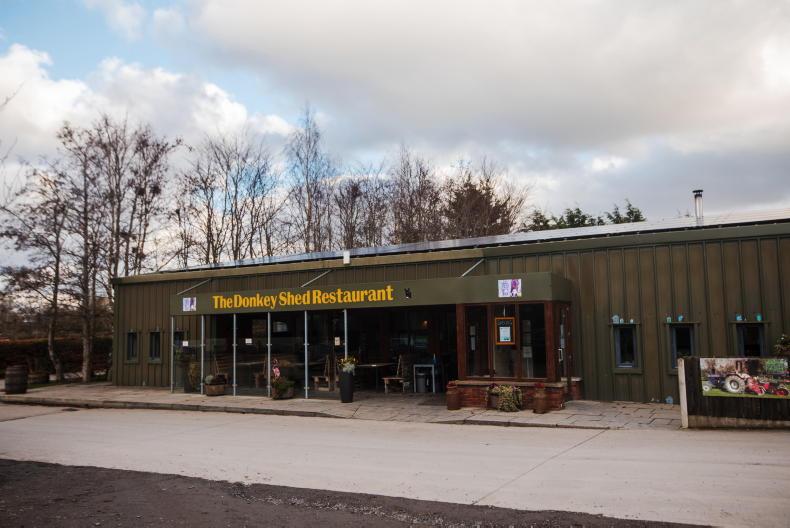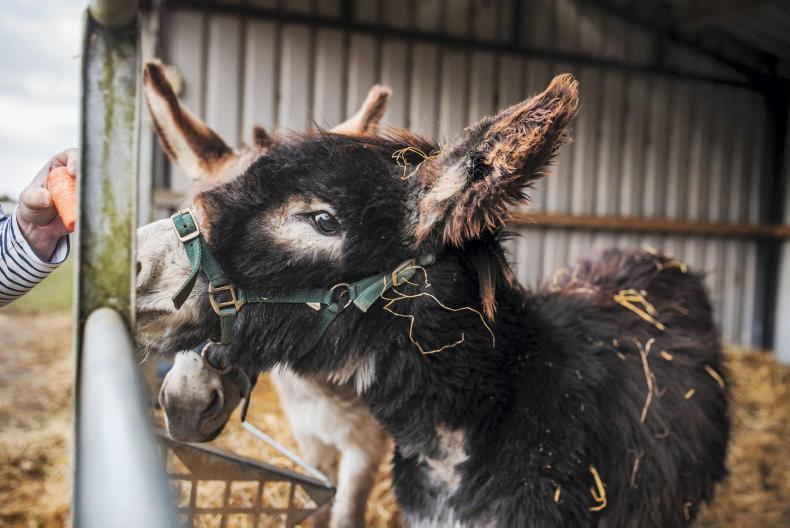
LOYALTY CODE:
The paper code cannot be redeemed when browsing in private/incognito mode. Please go to a normal browser window and enter the code there

LOYALTY CODE:
The paper code cannot be redeemed when browsing in private/incognito mode. Please go to a normal browser window and enter the code there
This content is copyright protected!
However, if you would like to share the information in this article, you may use the headline, summary and link below:
Title: Supporting local farmers: from farm to shop
As part of a series on farm shops in Ireland, we head to Newbarn Farm & The Donkey Shed Restaurant in Meath, which is celebrating 20 years in business, writes Dee Laffan and Grace Hanna.
https://www.farmersjournal.ie/supporting-local-farmers-from-farm-to-shop-800993

LOYALTY CODE:
The paper code cannot be redeemed when browsing in private/incognito mode. Please go to a normal browser window and enter the code there

CODE ACCEPTED

You have full access to farmersjournal.ie on this browser until 9pm next Wednesday. Thank you for buying the paper and using the code.

CODE NOT VALID
Please try again or contact us.
For assistance, call 01 4199525
or email subs@farmersjournal.ie
Sign in

Incorrect details
Please try again or reset password
If would like to speak to a member of
our team, please call us on 01-4199525
Reset
password
Please enter your email address and we
will send you a link to reset your password

If would like to speak to a member of
our team, please call us on 01-4199525
Link sent to
your email
address
![]()
We have sent an email to your address.
Please click on the link in this email to reset
your password. If you can't find it in your inbox,
please check your spam folder. If you can't
find the email, please call us on 01-4199525.
![]()
Email address
not recognised
There is no subscription associated with this email
address. To read our subscriber-only content.
please subscribe or use the reader loyalty code.
If would like to speak to a member of
our team, please call us on 01-4199525
 This is a subscriber-only article
This is a subscriber-only article
Update Success !

There is something charming about travelling through the countryside and stopping off at a farm shop to buy local produce direct from the farmer. A café or restaurant is an added bonus, allowing you to taste it onsite– the proverbial farm to fork.
Farm shops are an add-on to farming businesses that drive consumer engagement, community interaction and, most importantly, provide an extra retail outlet for produce.
Newbarn Farm
One such farm shop that has been open for 20 years is Newbarn Farm & Donkey Shed Restaurant near Ashbourne, Co Meath. A family-run business set on their 33-acre farm, it was originally started in 2004 by William and Yvonne Ruiter, who have been growing vegetables for 40 years.
Passionate horticulturalists, the couple started out growing their vegetables to supply supermarkets. However, they became frustrated with this relationship after seeing the waste resulting from supermarkets demands, wanting produce that was uniformly one shape and size. They also had issues around packaging on fresh produce and disliked the amount of time it took their vegetables to get from their farm to the customer.
“My dad used to grow leeks and broccoli for Quinnsworth in the 90s,” says Andrew Ruiter, William’s son who now runs the business.
“When Tesco came into the country, demand increased and also around that time there were new Bord Bia regulations coming into play, which all meant he would have to either increase acreage or decrease.
“He decided to move the farm 6km up the road to where we are now, decreasing the farm size. He started supplying to Dublin City Corporation to markets in the city. He was growing leeks, broccoli, cauliflower and cabbage and as we were now closer to Ashbourne town, he found that neighbours and local people would wander into the yard asking to buy vegetables. That was the start of it. Realising he was onto something; he opened the small farm shop.”

From shed to shop
Taking matters into their own hands, the farm shop was in the corner of one the sheds selling directly to customers. Over the years, it expanded and with the addition of The Donkey Shed Restaurant in 2011, they are now open all week to customers. Andrew and his sister Saskia also joined the business and it has been thriving and evolving to reach its 20th year in business.
“Initially, we were selling eggs from our hens, our own brassicas, and there was a local lad down the road who grew strawberries, so we’d sell a few of them in the summer. As time went on, it’s just kind of grown,” says Andrew.
“Nowadays, the farm shop is fully stocked all the time with seasonal produce. We grow carrots, beetroot, kale, broccoli, cabbage, white and red cabbage, suedes, sprouts, courgettes, scallions, leeks, onions, and Queen potatoes. We will grow pumpkins for Halloween. If we don’t grow it, then we get local produce from growers such as salad leaves, green beans and strawberries. We don’t have a glasshouse here, so a lot of produce grown in those comes from North County Dublin. For example, the strawberries we get are from Donnelly’s Farm on Glasscarne Lane, Ratoath, just down the road from us.
“In summertime, it could be 75% of the produce that’s on sale is either grown by ourselves or sourced locally. Then during winter, we do import some produce. However, I don’t deal with too many wholesalers anymore, I’ve started dealing directly with Holland to cut out the middleman. We’re buying apples, oranges, lemons, bananas, stuff that doesn’t grow here. We do this because we have to have a good wide range of everything for our customers on top of what we already have here ourselves. In saying that, our biggest seller is always our local produce. So, when we’ve got a lot of broccoli or cauliflower, for example, we will always give value in that because that’s what keeps people coming back time and again.”
Along with fresh produce, Newbarn Farm Shop also stocks a range of artisanal products including locally roasted coffee from Ariosa, a range of cheeses from Sheridans, and Wicklow preserves and jams. They also deal with Taste the View, who are an Irish artisan supplier and the Bare Pantry who do a range of sweet treats and snacks. Years ago, Andrew’s father was at a food expo in Spain and connected with a producer of olive oil, so they import that directly.
Another aspect of their farm shop that is very important to the family is packaging. “We don’t like to see fruit and vegetables wrapped in cellophane or something like that,” says Andrew. “I have always hated it. In our farm shop, everything’s always loose. When I’m buying stuff off producers, I deal with suppliers where it’s always in the loose crates too.”
The Donkey Shed Restaurant
The establishment itself has also grown to include a restaurant and as Andrew explains, it was a necessary addition for the survival of the business as a result of the last recession.
“The restaurant was the next step forward to keep bringing people here. After 2008, with the recession, we really started seeing the bottom pricing in supermarkets and people were very aware of what they were spending on vegetables. If you remember the kilo of carrots for 49 cents and all that? We can’t compete with that. It’s impossible. So, we had to try and figure out something else to get customers to come and buy from us directly. The restaurant was the answer for us. My sister Saskia manages the running of it.”
The Donkey Shed Restaurant is open daily from 9.30am-4.30pm, with a later opening time of 12pm on Sundays, offering casual dining for breakfasts and lunches, with fresh produce from the farm taking centre stage on the menu.
“We change up the restaurant about four or five times over the season,” says Andrew. “The menu changes to reflect what’s in season, so at the moment we have bacon and cabbage on the menu because there is so much cabbage. But then we might switch to coleslaw with red cabbage or we have plenty of ramen red cabbage too. Salads now could be beetroot and goats cheese because beetroot is a very wintry vegetable and kale would be the main leaf in our salads at the moment.
“Come summertime, we deal with farmers in North County Dublin, like Foley’s tomato growers and we create dishes inspired by their produce.”

Access to animals
As an additional enticement for families to spend time on Newbarn Farm, customers are given free access to a small petting farm. Andrew says, “The farm is just there for the kids to go up and see a few animals, walk around and feed them. We provide carrots to give to the animals.
“Now we’ve only a few as it’s wintertime, so there are two donkeys, some goats and a few pigs. In the summertime we have sheep, lambs and calves, chickens and ducks. It’s not there to make money, it’s there because we are a farm and want to connect people in that way too.”
Farm shops in Ireland
Farm shops have always played a significant role in the food and agriculture industry in Ireland. Serving as essential outlets for locally-grown and produced food, they provide a direct link between the farmer and consumer. They not only contribute to the economic sustainability of rural communities, but also connect communities socially as hubs for entertainment, activities and trade.
Supermarkets are increasingly restrictive with demands on vegetable farmers and these local outlets are lifelines, in some cases, in gaining customer bases rurally and garnering awareness of the growing vegetable crisis in Ireland due to these market demands but also climatic challenges faced by farmers.
Supporting local is something we can all participate in and as consumers, connecting with where our food comes from is more important than ever.
Newbarn Farm is open Monday to Saturday 9am-6pm and on Sundays and bank holidays 12-6pm. https://newbarnfarm.ie/
SHARING OPTIONS: